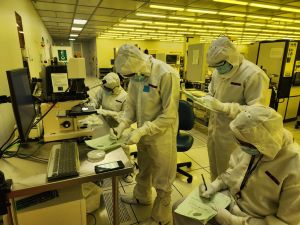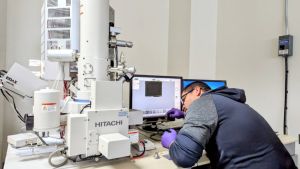The Microelectronics and Nanomanufacturing Veterans Partnership (MNVP) project utilizes the knowledge and resources developed over the past 25 years by other Advanced Technological Education projects funded by the National Science Foundation at Penn State University to bring military veterans into the nanotechnology workforce.

By pairing four community colleges with research universities near them, the project also builds on the strengths of each institution. Sixty veterans have participated during the first three semesters of the program offered at Rio Salado College and Arizona State University in Arizona; Southwestern College and University of California, San Diego in California; Georgia Piedmont Technical College and Georgia Institute of Technology in Georgia; and Tidewater Community College and Norfolk State University in Virginia.
Promising results have led to plans to expand the project at Tompkins Cortland Community College and Cornell University in New York; at Columbus State Community College and Ohio State University in Ohio; and at Tarrant County College and University of Texas at Arlington in Texas. MNVP classes will begin in fall 2024 in these regions where semiconductor manufacturing and related industries are growing.
“The community colleges go out into the community—because they have that sense of community—and they recruit these veterans into the program. But what they don't have is these state-of-the-art cleanrooms required to do the training for the veterans. So the research universities come in there and they open up the doors to their facilities,” said Zachary Gray, managing director of the Center for Nanotechnology Education and Utilization (CNEU) at Penn State.
“Without the community colleges it wouldn't be possible. Without the research universities it wouldn't be possible,” Gray added.
Gray knows well the benefits of cross-sector collaborations. He is a 2007 graduate of the nanofabrication associate degree program that the National Center for Nanotechnology Applications and Career Knowledge (NACK), an ATE center, developed in partnership with Pennsylvania community colleges.
Following his nanotech capstone semester at Penn State’s main campus and graduation from Reading Area Community College, Gray continued his academic studies and nanotech lab work at Penn State where he earned a Ph.D. in materials science. He was employed as an application scientist in industry for five years before returning to Penn State in 2022 to manage the day-to-day operations of the CNEU.
MNVP Principal Investigator Osama O. Awadelkarim together with CNEU faculty developed the 12-week certificate program for veterans with the input of six industry partners. Awadelkarim, the United Nations Educational, Scientific and Cultural Organization (UNESCO) Chair and Professor at Penn State and director of the CNEU, also incorporated the effective practices of the Remotely Accessible Instruments for Nanotechnology (RAIN) network. RAIN was created with ATE grant support for remote delivery of nanocharacteriazation and nanofabrication lessons to community college students and faculty around the country. During testimony before a Congressional subcommittee in 2022, Awadelkarim advocated for the federal government to use community college-university partnerships like those developed by NACK and CNEU to build the micro- and nanotechnology workforce.
Potent Hybrid Provides Opportunity to Multiple Credentials

MNVP is a potent hybrid of remote and in-person instruction.
Vishal Saravade, assistant teaching professor at Penn State, leads a two-hour lecture session each weekday for 12 weeks. Some of the community colleges have classrooms where the student veterans can attend the lectures together. Others have students view the lessons from their homes. The community college faculty, who mentor the students, and the university faculty, who teach the hands-on lessons in the cleanrooms, work out logistics of the in-person instruction at each of the four regions.
Students who earn 60% or better grades during the free, 12-week program receive a certificate from the CNEU. At no cost students may also take three ASTM International certificate exams, which NACK developed for novice and experienced technicians. The three stackable certificates include Health and Safety in Nanotechnology; Nanotechnology Workforce Characterization; and Workforce Certificate for Nanotechnology Workforce Fabrication and Related Infrastructure.
“We've modeled our curriculum such that someone off the street—as long as they are willing to work [and] have a basic academic profile—they will be able to complete this course successfully. Now in terms of the skills they had in the military, the technical skills are really what the industry is looking for. So for the people that worked on fixing aircraft and the people that worked, you know, on radar, those types of things. Those are the types of skills that translate best to the semiconductor industry,” Gray said.
During the past year the project’s roster of industry partners has grown from six to 12 and includes several of the largest nanotechnology companies. Each partner has the option of making a presentation to the students.
The industry partners do give the MNVP students preferences for interviews. Job placements are not guaranteed; however, Gray said the industry partners are very interested in the student veterans. With nanofabrication technician jobs expected to start growing in the third quarter of 2024, Gray said some participants have found employment with smaller companies in related industries.
For example, he’s aware of two MNVP participants who were hired by small companies that use scanning electron microscopes. One works as a service technician who fixes the microscopes; the other is an operator who runs the tool.
One Student’s New Career Launch
Matt Feyereisen is one of those participants. He attended the program at Rio Salado College and Arizona State University, earning the program’s nanomanufacturing certificate and two of the ASTM International Workforce certificates. He also took an eight-week vacuum technology course and one-week course on solar panels.
“All these facets complimented each and created an industrial triangle of know-how that I was able to use when looking for a new job,” Feyereisen wrote in an email reply to questions.
He had been a graphic designer since completing his Navy service in 1999, but was feeling burnt out when his wife told him about the radio commercial she heard for the nanotech program for veterans. It has provided the launch he was seeking to a new science-related career.
“I was able to land a job with a company that sells and fixes electron microscopes. It requires a new skill set of troubleshooting, customer service, and interaction with engineers. My coworkers all have mechanic and engineering degrees, so it was refreshing to work with a talented bunch of brainiacs that think like me. Working on scientific equipment was never in my vision so the schooling helped me overcome the hurdles in understanding what I was now looking for in a career path,” he wrote.
The complex lessons in the compressed courses were challenging, but they also connected to his military service duties maintaining aircraft camera systems that involved electronic, optical, mechanical, and vacuum technologies.
Gray said other veterans have found similar links.
Program Polishes Veterans' Technical & Soft Skills
“A lot of these veterans with these very technical backgrounds don't realize and aren't made aware of how well their skills translate to adjacent industries. A lot of these veterans have skills with, you know, electronics and troubleshooting ... and they don't make the connection that those skills are 90% applicable to going in and working in a fab and fixing etch equipment,” Gray said, explaining he sees the program as a catalyst for making the most of the skills that the veterans possess.
“When they start this program, they already have almost all of the skills the industry wants, but they need to be polished in two ways. They need to get the specific training relevant to the industry. ... [and] they need to learn a lot of the soft skills. So a lot of these vets are lacking skills with something as simple as how to interview, or how to create a resume or, how to share a PowerPoint presentation on a Zoom call,” Gray said, noting almost all first interviews are done virtually now.
Veterans' Feedback Informs Program Refinements
In addition to industry input, the MNVP has been shaped by student feedback.
For example the students enrolled in spring 2023, the pilot semester, reported that it was extremely difficult to complete the group research projects with the hybrid arrangement. Afterward the faculty members agreed to make the research projects individual student assignments. And, instead of randomly assigning topics, each student now proposes three nano-related research topics from which instructors choses one for them.
“Those two changes have really enhanced the project presentation experience,” Gray said.
To help the students practice their public speaking and interview skills, the students give their reports during Zoom sessions attended by the other students and as many of the instructors from the partner institutions as possible.
Other refinements in the works include hiring a recruitment specialist to boost the enrollment at the partner sites that have not filled all their seats and enhancing the orientation so the veterans understand instructors’ expectations and what the program will cover prior to the first week of classes.
 Subscribe
Subscribe


 See More ATE Impacts
See More ATE Impacts
Comments
There are no comments yet for this entry. Please Log In to post one.